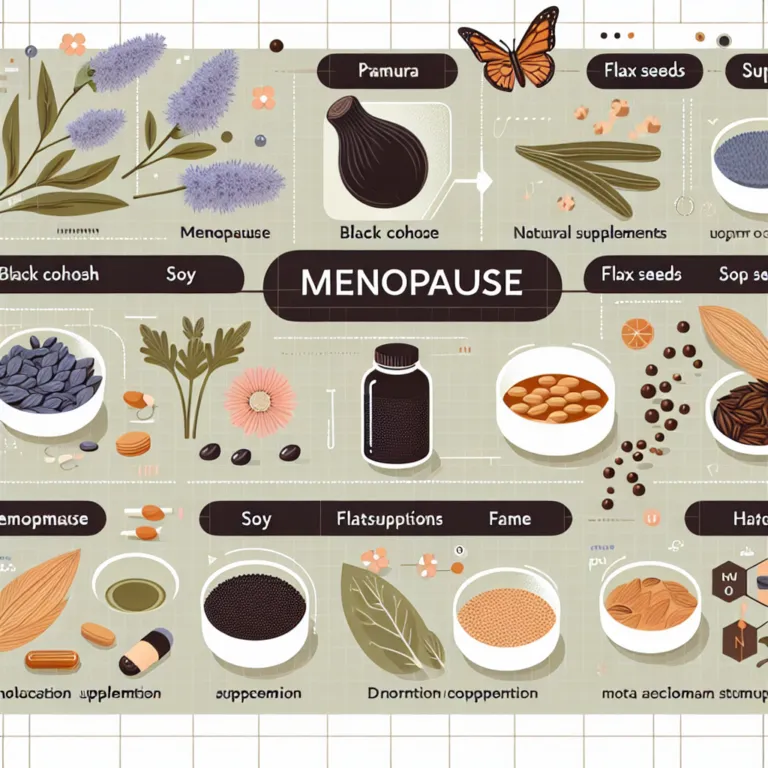
Menopause is a natural stage in a woman’s life that marks the end of her reproductive years. It is often accompanied by a range of symptoms, including hot flashes, night sweats, mood swings, and changes in libido. While these symptoms can be challenging to navigate, there are ways to manage them effectively, including the use of supplements. In this article, we will explore the benefits of taking supplements during menopause and how they can help alleviate symptoms and support overall health.
The Role of Supplements in Menopause
During menopause, the body undergoes significant hormonal changes, particularly a decrease in estrogen levels. These changes can lead to a variety of symptoms that impact a woman’s quality of life. Supplements can play a crucial role in supporting the body during this transitional period by providing essential nutrients and herbal extracts that can help alleviate symptoms and promote overall well-being.
Key Benefits of Taking Supplements
- Relief from hot flashes and night sweats
- Support for bone health and osteoporosis prevention
- Improvement in mood and cognitive function
- Enhancement of energy levels and overall vitality
Supplements can provide a natural and holistic approach to managing menopausal symptoms, offering women a safe and effective alternative to traditional hormone replacement therapy.
Popular Supplements for Menopause
There are a variety of supplements available on the market that are specifically formulated to support women during menopause. These supplements often contain a blend of vitamins, minerals, and herbal extracts that target common symptoms and promote overall health. Some popular supplements for menopause include:
Black Cohosh
Black cohosh is a herb that has been traditionally used to help alleviate hot flashes, night sweats, and mood swings during menopause. It is believed to have estrogen-like effects that can help balance hormone levels and reduce symptoms.
Calcium and Vitamin D
Calcium and vitamin D are essential nutrients for bone health and are particularly important during menopause when women are at an increased risk of osteoporosis. Supplementing with calcium and vitamin D can help maintain bone density and reduce the risk of fractures.
Omega-3 Fatty Acids
Omega-3 fatty acids are known for their anti-inflammatory properties and can help reduce inflammation in the body, which may be beneficial for managing joint pain and other menopausal symptoms. They are also important for heart health and cognitive function.
Choosing the Right Supplements
When selecting supplements for menopause, it is important to choose high-quality products from reputable brands. Look for supplements that are specifically formulated for menopausal women and contain a blend of nutrients and herbal extracts that target common symptoms. It is also a good idea to consult with a healthcare provider before starting any new supplement regimen to ensure that they are safe and appropriate for your individual needs.
Comparing Different Brands
There are many supplement brands on the market, each claiming to offer the best products for menopause. It can be overwhelming to choose the right one, so it is important to do your research and read reviews from other women who have tried the products. Look for brands that use high-quality ingredients and have a good reputation for efficacy and safety.
Best Practices for Taking Supplements
To get the most out of your supplements during menopause, it is important to follow best practices for optimal results. Here are some tips to keep in mind:
- Take supplements as directed on the label
- Be consistent with your supplement regimen
- Pair supplements with a healthy diet and regular exercise
- Monitor your symptoms and adjust your supplement intake as needed
By incorporating supplements into your daily routine and following these best practices, you can effectively manage menopausal symptoms and support your overall health and well-being.
FAQs About Taking Supplements During Menopause
1. Are supplements safe to take during menopause?
Supplements can be safe and effective for managing menopausal symptoms when taken as directed and in consultation with a healthcare provider. It is important to choose high-quality products and monitor your symptoms for any adverse reactions.
2. Will supplements interact with other medications I am taking?
Some supplements may interact with certain medications, so it is important to consult with your healthcare provider before starting any new supplement regimen. They can help determine if there are any potential interactions and recommend the best course of action.
3. How long does it take to see results from taking supplements?
The time it takes to see results from taking supplements can vary depending on the individual and the specific supplement. Some women may notice improvements in their symptoms within a few weeks, while others may require longer to see significant changes. It is important to be patient and consistent with your supplement regimen.
4. Can I stop taking supplements once my menopausal symptoms improve?
It is generally safe to stop taking supplements once your menopausal symptoms improve, but it is important to consult with your healthcare provider before making any changes to your regimen. They can help determine if it is safe to discontinue supplements or if you should continue taking them for ongoing support.
5. What are some natural alternatives to supplements for managing menopausal symptoms?
In addition to supplements, there are several natural alternatives for managing menopausal symptoms, including dietary changes, exercise, stress management techniques, and herbal remedies. It is important to explore different options and find what works best for your individual needs and preferences.
In conclusion, supplements can be a valuable tool for women navigating menopause by providing essential nutrients and herbal extracts that can help alleviate symptoms and support overall health. By choosing high-quality products, following best practices, and consulting with a healthcare provider, women can effectively manage their menopausal symptoms and improve their quality of life during this transitional period.